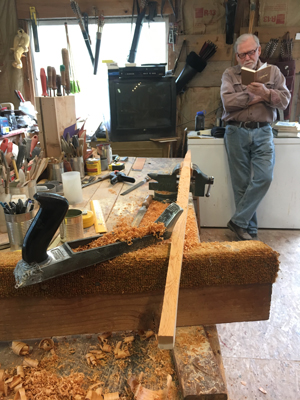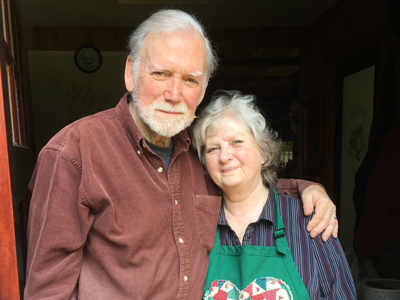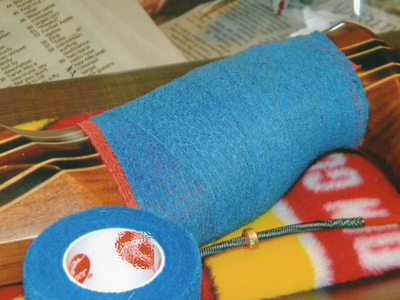It is with a heavy heart I share the sad news that the Longbow world has lost one of the greats. Gerald (Jerry) Welch of Welchman Longbow Company passed March 18, 2020. His dear wife, Pat Welch, asked that I share this sad news, and that the Welchman Longbow Company is no longer operating.
Although Jerry and Pat touched the lives of countless souls either through the church or the world of archery, I felt compelled to share my story of how we met and the influence he had in my life.
In the spring of 1997, I had just graduated college and was on a solo Alaska black bear hunting adventure to Prince of Wales Island (POW). I had rented an outboard motor from a guy in Coffman Cove as part of my hunting plans. After seeing (and mocking) the longbow and cedar arrows in my Jeep, he suggested I go see the “longbow guy” in Whale Pass before I leave the island.
Toward the end of the trip I had made my way north up the gravel roads to Whale Pass and ran into Jerry and another man he introduced as “Chief” A.J. milling about in Jerry’s yard. Evidently, Chief was training to shoot a 200 pound war bow. The significance of the weapon and the magnitude of this feat were lost on the ignorance of my youth at the time. While there, I shot one of Jerry’s English longbows and I was amazed at the speed and performance of the all yew bow. We talked about bows, hunting, archery, Sitka spruce arrows, and his plans for obtaining doweling machinery. We exchanged addresses and I left the island.
Over the next few years we exchanged letters concerning the Sitka shafting. Unfortunately, the arrow production never came to fruition. At least not in bulk. Time went on and we lost contact.
Fast forward 10 years and I found myself living on POW with a new position in the Forest Service. I’d bumped into Jerry on occasion, but schedules never aligned for getting together. Eventually, I heard he was offering bow building classes and I jumped on the opportunity. He was retiring from his role as pastor of the Whale Pass Bible Church, allowing him more time to focus on making longbows and offering classes.
I explained to Jerry that the true, English longbow was the only bow I was interested in learning to make. The historic allure and the simple tools needed to create these bows was most appealing. He understood completely and we hit it off immediately. As soon as I finished the first English longbow, I requested to make another under his tutelage. That progressed into a third and the solidifying of a great friendship. With classical music over the satellite radio station, we passed the hours in his shop improving my knowledge of bow making and discussing all manner of topics.
 From classic archery literature, characteristics of yew, archers and bowyers of the past, especially his mentor, Gilman Keasey, we covered it all. Shop time was rewarded with midday coffee breaks brewed with beans roasted in their wood burning stove by Jerry’s lovely wife, Pat. There never seemed to be enough time in the day to get all my questions in and I regretted when it was time to leave.
From classic archery literature, characteristics of yew, archers and bowyers of the past, especially his mentor, Gilman Keasey, we covered it all. Shop time was rewarded with midday coffee breaks brewed with beans roasted in their wood burning stove by Jerry’s lovely wife, Pat. There never seemed to be enough time in the day to get all my questions in and I regretted when it was time to leave.
One of my fondest memories was working with Jerry on my last bow together. I had become just confident in my skills to be dangerous and all but ruined a premium stave with a careless cut in the bandsaw. As soon as I hit the pencil line, I knew I was in over my head. I reported the blunder to Jerry and prayed under my breath that the mistake could be remedied. He got quiet (not a good sign) and looked the stave up and down and went back the bandsaw. With a few deft passes in the saw and a new centerline, I was back in business.
I slowed my pace and went back to work. Disaster averted; Jerry busied himself on the adjacent workbench crafting a leather quiver along with a dozen arrows for a customer. Casually, he would discretely raise a brow as he passed by checking my progress. Satisfied I was past needing further intervention and in a lull of his work, he picked up a copy of “The Witchery of Archery” and began reading aloud while I rasped away. I had to stop and just listen. Jerry was mesmerizing both in skill and the spoken word.
From his humble beginnings in Oregon working from horseback on a ranch to becoming an OSHA inspector and logging on POW, Jerry lived a full and exciting life. His love of archery and the history of the longbow could only be surpassed by the love for his wife and God.
In the February/March 1993 issue of Traditional Bowhunter Magazine, Paul Forte interviewed Jerry. His final question asked, “How would Gerald Welch like to be remembered?”
I want to be remembered as an honest craftsman who did the very best he could, who produced a product that was enjoyable and beautiful and did it with integrity. I don’t think anybody can go out of this world with more than that.
You are remembered Jerry, for that and so much more.
My deepest condolences to Pat and the rest of Jerry’s family.







Thank you for your lovely memories. Dad will be missed dearly.
A truly amazing Godly man and my mentor. I will see him again someday!
Thank you Scott for sharing your time and experiences with such a kind and decent fellow as Jerry Welch. You were clearly enriched and the better for it, and we too are enriched for reading your interesting story of Jerry. Traditional archery and hunting sure does attract some really decent and fascinating people – both men and women, young and old.
I have just read with sadness the passing of Jerry Welch.
I had the pleasure of meeting Jerry in Oregon back in 1992 for an interview I did with him in Traditional Bowhunter Magazine. We spent hours over two days conversing about a wide range of topics, from how to select and cut yew to conservation and the future of hunting.. I have not been a part of the traditional archery scene for some time, but spoke to him a few years back about a beautiful Welchman Longbow that at 60# was getting a little heavy for me. I intended to send the bow to Jerry so that he could reduce it, but somehow never got around to it. I regret I did not because we would have had some memorable exchanges.
It was a great privilege to have spent time with Jerry and seen him in action. He was a skilled craftsman, a good archer, a fine conversationalist, and a gentleman. Certainly he touched my life and enriched my understanding of tradition. I cannot doubt there are many out there who would say the same.
Paul Forte
HELLO I HAD THE PLEASURE OF MEETING AND WORKING WITH JERRY. I HAD BEEN READING ABOUT HIM FOR OVER 40 PLUS YEARS IN ARCHERY MAGAZINES. FINALLY I MOVED TO A LITTLE VILLAGE CALLED NAUKATI BAY ALASKA ABOUT 30 MILES SOUTH OF WHALE PASS, ALASKA. THEN I HEARD THAT HE WAS OFFERING BOW MAKING CLASS’S. THIS WAS ALL HAPPENING IN 2018. HE WAS A AMAZING TEACHER AND LOVED WHAT HE WAS DOING AND MADE IT LOOK SO SIMPLE I COULD NOT BELIEVE WHAT WAS SEEING. AFTER ABOUT FOUR OR FIVE DAYS I MADE ONE OF THE NICEST BOWS I OWN. HE WAS A REMARKABLE MAN AND WILL NEVER FORGET THE TIME I HAD LEARNING FROM THE MAN.
REST IN PEACE JERRY YOU WILL NEVER BE FORGOTTEN–HOOTER–NAUKATI BAY,ALASKA 2020
Iam so sorry to hear this news. I never met him …but I do have one of his bows built Jan 2000. And also a dozen of his Sitka spruce arrows. People know this bow when they see it….fine craftsmanship…and a shooter ! It will be handed down to one of sons and never leave the family. Prayers sent to all.
Never met jerry but we exchanged several letters when i was having hard times. I new from the start he was a special man. One of my dreams was to go to Alaska and see him. Learn bow making. Thank God for people like Jerry. Be with Jesus pastor Jerry. Always you have my greatest admiration and brotherly love. I’ll meet you one day after i leave the planet.
A friend from Port Portection and I went on a road trip on the island and he wanted to find this man that made longbows. We drove around asking anyone we could find if they knew him or where he might be and we found ourselves next to the church that I believe he was the minister. We knocked on his door and he said he was about to take a shower and go somewhere but he would give us a little tour and for the next 2 hours he showed us the shop and how he would traveled to Oregon for the Yew wood for the bows. He found it interesting that I lived on Yew St. Rd. In Bellingham Wa. He answered the door to two strangers with there wives on his day off and gave us 2 hours and taught us more than we would have ever known without him. I called a couple times and talked to him about a bow and I waited to long . For some reason I thought of him today and looked up his wife and talked to her and she spent time on the phone with me . I found out that they were in Bellingham awhile back for a few days and I wish I could have known because I would have loved to show him my place and hopefully the Yew trees I have might have met his standards. I will send Pat my contact info if you get down here again please call.
Thank you, Gerald, for my excellent warbow. I do expect to pass it on to my grandson.